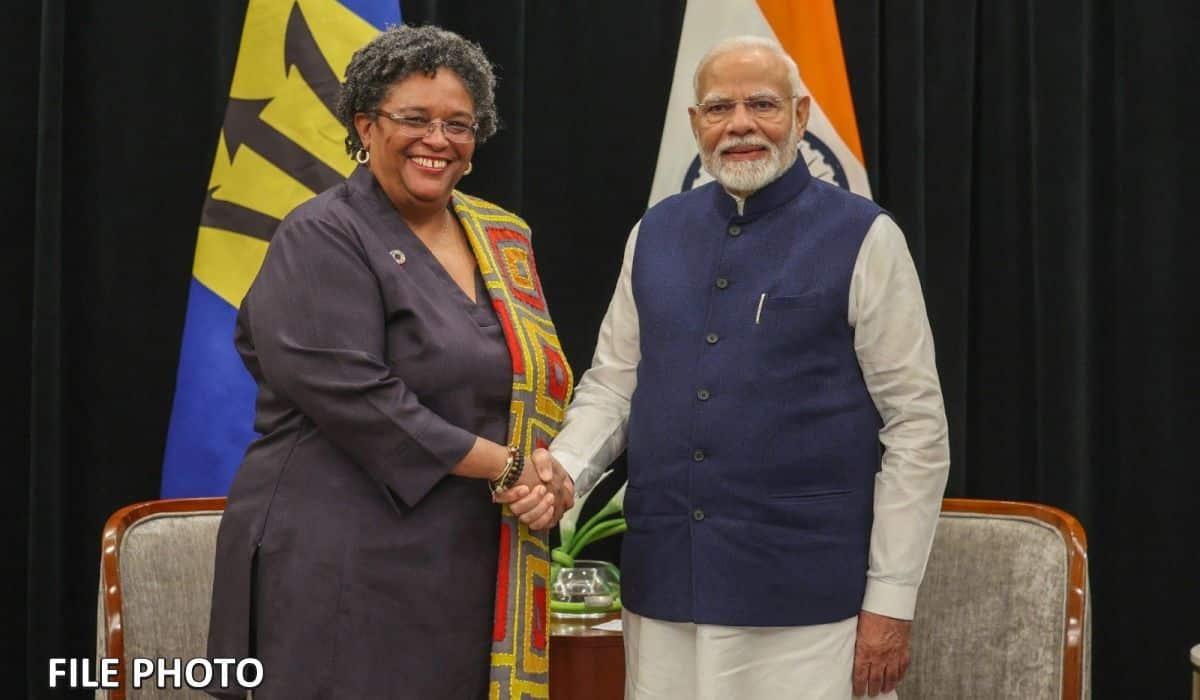Chief Minister of Maharashtra Shri Uddhav Thackeray ji, former Chief Minister of Maharashtra Shri Devendra Fadnavis ji, Shri Chandrakant Patil Ji, Shri Radhakrishna Patil Ji, Sujay Vikhe Patil Ji, other public representatives present at the event, all my farmer friends, ladies and gentlemen! I pay my homage to Chatrapati Shivaji Maharaj and salute Maharashtra, the land of brave sons and daughters!!!
I am immensely grateful to Radhakrishna Vikhe Patil ji, his family and all my friends from Ahmednagar who have invited me to be a part of this pious occasion. Initially it was decided that I would be present there with you all. But due to Corona pandemic, we are participating in this event virtually today.

Friends,
Although the autobiography of Dr. Balasaheb Vikhe Patil ji has been released today, the stories of his life can be found in every part of Maharashtra. I too have seen closely how Balasaheb Vikhe Patil had devoted himself to the development of Maharashtra, following the footsteps of Dr. Vitthalrao Vikhe Patil ji. Mitigating the sufferings of the villages and the poor, and making the lives of the farmers easy have been the mainstay of Vikhe Patil's life. He has also written in his autobiography - “मीस्वत: सत्तेपासून वा राजकारणा पासून अलिप्त राहिलो नाही, मात्र ‘समाजा-साठीच राजकारण आणि सत्ता’ हे पथ्य मी कायम सांभाललं। राजकारण करताना माझा सतत समाजाचे प्रश्न सोडवण्यावर भर राहिला”। He had always worked for the betterment of society through power and politics.
He always stressed on how to make politics a medium for bringing a meaningful change to the society, how to solve the problems of the villages and the poor. This idea of Balasaheb Vikhe Patil made him different from others. This is the reason why even today, he musters great respect from every party. His contribution and efforts for the development of the village poor, for education, and the success of cooperative movement in Maharashtra will always inspire generations to come. Therefore, this book on the life of Balasaheb Vikhe Patil is very important for all of us

Friends,
Dr. Balasaheb Vikhe Patil had witnessed, understood and felt the pain of the village, the poor and the peasants closely. So he brought the farmers together, connected them with co-operative movement. It is due to his efforts that the area which was once forced to live in tottering condition has been completely transformed today. On the importance of co-operative movement, he has written that सहकारी चलवल ही खरी निधर्मी चलवल आहे।ती कुठल्या जातीची किंवा धर्माची बटीक नाही। आतापर्यंत सगल्या समाजाला, जातीं नाही प्रतिनिधित्व दिले आहे। That is, the cooperative campaign is truly impartial. It has nothing to do with any caste or creed. It represents all the sections of society. In a way, for him, cooperative was the path of welfare for all. As a Minister in Atal ji's government, he encouraged cooperative movement not only in Maharashtra, but in many other areas of the country. In such a situation, the title 'Deh Vechava Karani' is relevant to his 'autobiography'; it is quite apt. This line of Saint Tukaram Ji Maharaj have the essence of Balasaheb Vikhe Patil's life.
Friends,
When no one talked of rural education in the country, at that time he had worked to encourage the youth of the villages through Pravara Rural Education Society. We are well aware of the work that he had done through this Society to create awareness in the villages and for the education and skill development of the youth in the villages. In such a situation, it is equally appropriate to associate Balasaheb's name with Pravara Rural Education Society. He had understood the importance of education in farming and in the villages. He has written in his autobiography - शेतीच कौशल्य असल्याशिवाय सुशिक्षित माणूसही सहज शेती करू शकत नाही। खरं तर शेतीला इंटरप्राइज का म्हणत नाहीत। That is, no matter how educated a person is, if he does not have farming skills, he will never be able to do farming. When this is the case, why do we not call farming an enterprise?

Friends,
This question did not arise in the mind of Balasaheb Vikhe Patil just like that. He had said these words based on what he had experienced for decades at the ground level. The answer to this question of Balasaheb Vikhe Patil lies in today's historic agricultural reforms. Today, opportunities are being created to take the farmer from the role of a farmer to that of an entrepreneur and to take him towards entrepreneurship. Sugar has revolutionized Maharashtra; Milk has brought a revolution in Gujarat, wheat has brought revolution and transformation in Punjab; this model of local economy and local enterprise will take the country forward.
Friends,
There was a period after independence when the country did not have enough food to feed. In that situation, the priority of the government was how to increase the productivity of the crop. Therefore, all the attention was on what crop the farmer should produce and how much he should produce! Our farmers too had worked hard and fulfilled the country's needs by producing more and more crops. But with this concern for productivity, the focus of the government policies was not on the farmers or the profitability of the farmer. People forgot about the farmers' income. But for the first time now this thinking has been changed.
For the first time, the country is concerned about the income of the farmer, and has made constant efforts to increase his income. Whether it is the decision to implement MSP, increase MSP, neem coating of urea or better crop insurance, the government has tried to overcome every little problem faced by the farmers. The PM-Kisan Samman Nidhi Yojana has freed farmers from the compulsion to go to others for small expenses. Under this scheme, one lakh crore rupees have been directly transferred to the bank accounts of farmers. Moreover, unprecedented work has also been done on cold chains, mega food parks and agro-processing infrastructure. The farmers have started benefiting from the modernization of village haats and major mandis.

Friends,
Balasaheb Vikhe Patil used to say- "शेती निसर्गाधारित केली जात होती।हे ज्ञान आज सांभालून ठेवलं पाहिजे। तसेच नव्या आणि जुन्याचा मेल तरी घातला पाहिजे।" That is, earlier farming was done keeping in mind the natural conditions. We must preserve that earlier knowledge. It is very important to combine both the new and the old methods in agriculture. The sugarcane crop is a very good example of a combination of new and old ways. This is more important in Ahmednagar, Pune and surrounding areas. Now industries are being set up to extract sugar as well as ethanol from sugarcane. There are around 100 such industries in Maharashtra right now and dozens of new industries have also received approval for the necessary aid. As the ethanol blending capacity in petrol will increase, the money being spent on oil will return to the farmers' pockets.
Friends,
Dr. Bala Saheb Vikhe Patil was also concerned with another problem in the villages of Maharashtra. The problem was related to the scarcity of drinking and irrigation water. Through the water councils in Maharashtra, he tried to create a mass movement in this direction. Today we can say with great satisfaction that after 2014, such efforts have been given an unprecedented boost and the identity of Devendra ji's government was established in every village and household due to their work on water related projects. Under the Pradhan Mantri Krishi Sinchayee Yojana, work was done rapidly to complete 26 projects that were in a limbo in Maharashtra for several years. Nine of these projects have been completed so far. On the completion of these projects, about 5 lakh hectares of land has received irrigation facility. Similarly, in July 2018, work was started on 90 more major and small irrigation projects in Maharashtra. After the completion of work on these projects in the next 2-3 years, about 4 lakh hectares of land will come under irrigation facilities. There are 13 districts of the state where the ground water table is very low. Atal Bhujal scheme is being implemented in these districts.
Friends,
Besides irrigation, the work for providing potable drinking water to every family of villages is also going on at a faster pace in Maharashtra. Under the Jal Jeevan Mission, 19 lakh families of Maharashtra have been provided with potable water facility during the last year. Out of this, more than 13 lakh poor families have been provided with water during the Corona pandemic. Just as the honour of the sisters and daughters was safeguarded and they were facilitated by constructing toilets in every household, in the same way, by giving them the facility of piped water supply, their time and labour can be saved. And potable water is also very good for health.
Friends,
Micro finance has a special role in the economic and social system of villages. A scheme like MUDRA has increased the chances of self-employment in the village. Moreover, over 7 crore sisters belonging to the Self Help Groups in the country have been given a loan of more than Rs 3 lakh crore. Farmers, livestock rearers and fishermen have been given the facility of Kisan Credit Card to help them get easy loans from banks. Nearly 2.5 crore small farmer families who were earlier deprived of Kisan Credit Cards are now being given this facility through this campaign.
Friends,
If the confidence gets instilled in the village, the villagers and the poor, then the resolve for self-determination will also become stronger. Balasaheb Vikhe Patil also wanted to infuse this belief of self-reliance in villages and kept instilling this confidence all his life. I am sure that whoever reads this autobiography will get a new consciousness. Once again, bowing down to Balasaheb Vikhe Patil ji, I wish you all the very best!
But before I end, I would like to say one thing with a lot of emphasis especially to the people of Maharashtra. We are still under threat from corona. In Maharashtra, this is all the more worrying and therefore I request all the citizens of Maharashtra to not neglect the rules of wearing masks on the face, frequent hand hygiene, and social distancing.We always have to remember, जब तक दवाई नहीं, तब तक ढिलाई नहीं। ( No carelessness till a medicine is found). We will definitely win this battle; we have to win; we shall win.
Once again, I pay immense respect to Balasaheb ji's entire family; because four generations were engaged in social service. This is not a small thing and it is a matter of joy that every generation is doing even more; doing even better. We know, generally some future generations get weaker; the second generation looks a little less powerful; the third generation even weaker and eventually there is a gradual deterioration. While Bala Saheb ji's values have been such that all his generations are increasingly doing more and more of the work; they are engaged in public service with more robust values. And this day is also an opportunity to salute such a family.
Thanks to all of you!
Thank you!!













